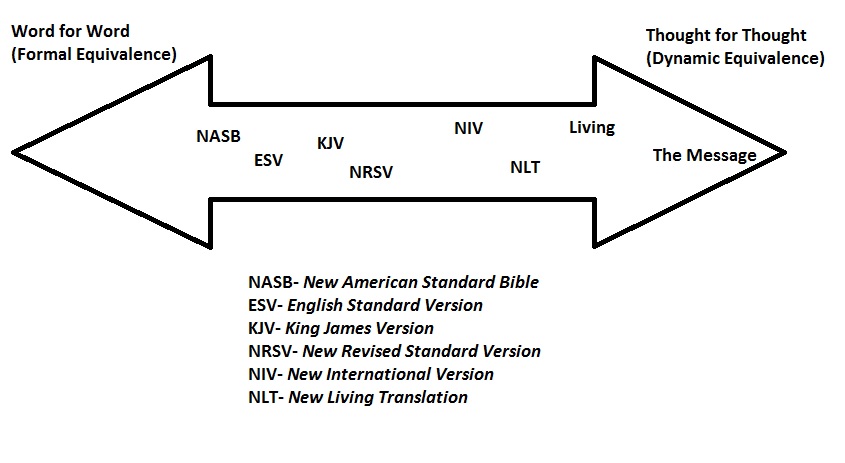 I often have people ask me which translation of the Bible is the best to use. My reply is, “It depends on what you are doing with it.” This sometimes catches people off guard assuming that there should be a one size fits all answer, after all how can the Bible be God’s unchanging Word if every translation seems to say something different? One of the first things to keep in mind about our English Bibles is that they are a translation from the original languages of Hebrew and Greek. As in all translation work, choices of sentence structure and word order must be made. We often structure our sentences in English around the basic layout of Subject, Verb, Object upon which we add adjectives, adverbs, or other modifiers. Other languages do not always structure their sentences in such a way, which makes word for word translating very difficult. For instance, our English Bibles have Jesus saying in John 15:1, “I am the true vine, and My Father is the vinedresser/gardener.” The word for word translation in the Greek is, “I am the vine true, and the Father of me the husbandman is.” A precise word for word translation does not make sense in the way we structure English. While this particular example is relatively straightforward (you can easily move the pieces around so they make sense to us) not all sentences in the Scriptures are. There are sometimes difficult decisions which must be made about which words belong together. In the above example, one can also see that not every Greek or Hebrew word has an English parallel. This is the real challenge of translation. Each translation or version of our English Bibles has a team (you can find out who was involved in the translation work by flipping to the front pages) working together to bring the Hebrew or Greek language into English. It is their task to choose a word which is true to the original language but also gives understanding for modern readers. The Greek word in John 15:1 ‘husbandman’ therefore gets translated into English as vinedresser or gardener depending on your translation. There are other instances in Scripture where more than two options of word choice could plausibly be used. These are two very basic issues which makes translating Scripture from the Hebrew or Greek to English challenging (there are many other issues which I’d be happy to talk with you about). We end up with a variety of translations because each version tries to do something different. This results in a spectrum of translation. Some versions try to be as true to a word to word translation as possible often at the expense of readability. This is known as Formal Equivalence. On the other extreme there are versions which strive for easy of reading and understanding (capturing the thought of the sentence) at the expense of the literal word, also known as Dynamic Equivalence. So, which translation is right for you? Well it depends! For an in-depth study of Scripture a translation on the Word for Word side of the spectrum would be ideal. If you are looking for a Bible for devotional use then a translation closer to the Thought for Thought side might suit your purposes. We are blessed to have a wide variety of English translations which are helpful for our growth as Christians. Having several translations available is always a good idea so you can compare words and thoughts to gain a better understanding of what God’s Word says.
No matter which translation you choose, it is always important to ask the Holy Spirit to open your eyes to see and heart to comprehend God's Living Word.
0 Comments
Leave a Reply. |
AuthorPastor J-M shares some occasional thoughts and musings on our life together as followers of Christ. The views are his own. Archives
October 2023
Categories
All
|
- Home
- About
-
Learning & Growing
-
Sermons
>
- 1 Samuel
- Lent
- Spiritual Conversation
- Advent
- 1 Timothy
- Single Messages
-
Older Sermons
>
- Judges
- Joshua
- Galatians
- Lamentations
- 1 Peter: Living Hope
- Acts
- What Does This Mean?
- Gospel Identity: Gospel Living
- Nehemiah
- Questions of Faith
- Proverbs
- Hebrews
- Sermon on the Mount
- 1 Thessalonians
- Psalm 23: Walking with the Lord
- I Believe: The Apostles' Creed and a Living Faith
- 1 Corinthians
- Difficult Questions
- Genesis: God's Endless Faithfulness
- The Lord's Prayer
- Mark
- Genesis
- Bible Studies >
- Kids
- Blog
-
Sermons
>
- Worship Videos & Resources
- Contact
- Home
- About
-
Learning & Growing
-
Sermons
>
- 1 Samuel
- Lent
- Spiritual Conversation
- Advent
- 1 Timothy
- Single Messages
-
Older Sermons
>
- Judges
- Joshua
- Galatians
- Lamentations
- 1 Peter: Living Hope
- Acts
- What Does This Mean?
- Gospel Identity: Gospel Living
- Nehemiah
- Questions of Faith
- Proverbs
- Hebrews
- Sermon on the Mount
- 1 Thessalonians
- Psalm 23: Walking with the Lord
- I Believe: The Apostles' Creed and a Living Faith
- 1 Corinthians
- Difficult Questions
- Genesis: God's Endless Faithfulness
- The Lord's Prayer
- Mark
- Genesis
- Bible Studies >
- Kids
- Blog
-
Sermons
>
- Worship Videos & Resources
- Contact


 RSS Feed
RSS Feed